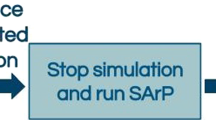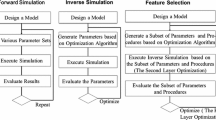Abstract
Many engineering applications rely on simulations based on partial differential equations. Different numerical schemes to approximate solutions exist. These schemes typically require setting parameters to appropriately model the problem at hand. We study the problem of parameter selection for applications that rely on simulations, where standard methods like grid search are computationally prohibitive. Our solution supports engineers in setting parameters based on knowledge gained through analyzing metadata acquired while partially executing specific simulations. Selecting these so-called farming runs of simulations is guided by an optimization algorithm that leverages the acquired knowledge. Experiments demonstrate that our solution outperforms state-of-the-art approaches and generalizes to a wide range of application settings.
Access this chapter
Tax calculation will be finalised at checkout
Purchases are for personal use only
Similar content being viewed by others
Notes
- 1.
anonymous.4open.science/r/simulation-optimizer-E691.
References
Bergstra, J., Bengio, Y.: Random search for hyper-parameter optimization. J. Mach. Learn. Res. 13, 281–305 (2012)
Davis, T.A., Hu, Y.: The university of Florida sparse matrix collection. ACM Trans. Math. Softw. (TOMS) 38(1), 1–25 (2011)
Guennebaud, G., Jacob, B., et al.: Eigen v3 (2010). http://eigen.tuxfamily.org
Halkidi, M., Vazirgiannis, M.: Clustering validity assessment: finding the optimal partitioning of a data set. In: IEEE ICDM (2001)
Hestenes, M.R., Stiefel, E.: Methods of conjugate gradients for solving linear systems. J. Res. Nat. Bur. Stand. 49(6) (1952)
Jiménez, J.: pyGPGO Python package (2020). https://github.com/josejimenezluna/pyGPGO
Kühnert, J., Göddeke, D., Herschel, M.: Provenance-integrated parameter selection and optimization in numerical simulations. In: USENIX TAPP (2021)
Lashkov, A., Rubinsky, S., Eistrikh-Heller, P.: S_dbw 0.4.0 (2019). https://pypi.org/project/s-dbw/
Li, L., Jamieson, K., DeSalvo, G., Rostamizadeh, A., Talwalkar, A.: Hyperband: a novel bandit-based approach to hyperparameter optimization. J. Mach. Learn. Res. 18(1), 1–52 (2017)
Li, X.S., Shao, M.: A supernodal approach to incomplete lu factorization with partial pivoting. ACM Trans. Math. Softw. (TOMS) 37(4), 1–20 (2011)
Liu, Y., Li, Z., Xiong, H., Gao, X., Wu, J.: Understanding of internal clustering validation measures. In: IEEE ICDM (2010)
Saad, Y.: ILUT: a dual threshold incomplete LU factorization. Numer. Linear Algebra Appl. 1(4) (1994)
Seeger, M.: Gaussian processes for machine learning. Int. J. Neural Syst. 14(02), 69–106 (2004)
Shahriari, B., Swersky, K., Wang, Z., Adams, R.P., Freitas, N.D.: Taking the human out of the loop: a review of bayesian optimization. Proc. IEEE 104(1), 148–175 (2015)
Van der Vorst, H.: Bi-CGSTAB: a fast and smoothly converging variant of Bi-CG for the solution of nonsymmetric linear systems. SIAM J. Sci. Stat. Comput. 13(2), 631–644 (1992)
Yang, L., Shami, A.: On hyperparameter optimization of machine learning algorithms: theory and practice. Neurocomputing 415, 295–316 (2020)
Acknowledgement
Funded by Deutsche Forschungsgemeinschaft (DFG, German Research Foundation) under Germany’s Excellence Strategy – EXC 2075 – 390740016.
Author information
Authors and Affiliations
Corresponding author
Editor information
Editors and Affiliations
Rights and permissions
Copyright information
© 2024 The Author(s), under exclusive license to Springer Nature Singapore Pte Ltd.
About this paper
Cite this paper
Meißner, J., Göddeke, D., Herschel, M. (2024). Knowledge-Infused Optimization for Parameter Selection in Numerical Simulations. In: Yang, DN., Xie, X., Tseng, V.S., Pei, J., Huang, JW., Lin, J.CW. (eds) Advances in Knowledge Discovery and Data Mining. PAKDD 2024. Lecture Notes in Computer Science(), vol 14650. Springer, Singapore. https://doi.org/10.1007/978-981-97-2266-2_2
Download citation
DOI: https://doi.org/10.1007/978-981-97-2266-2_2
Published:
Publisher Name: Springer, Singapore
Print ISBN: 978-981-97-2265-5
Online ISBN: 978-981-97-2266-2
eBook Packages: Computer ScienceComputer Science (R0)




